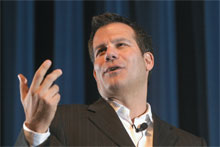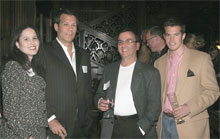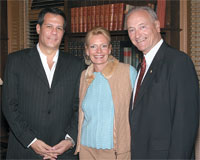




| Richard Florida Lights a Creative Spark for Colorado Springs | |
| By Susan Edmondson Photos by Tom Kimmell |
Richard Florida’s appearance at Colorado College provided an opportunity for the community to think differently about itself.
 |
| Humor and personal anecdotes enlivened Richard Florida’s presentation to hundreds of local citizens in Armstrong Hall. |
But Florida’s message that night wasn’t some lighthearted pop tune; it was more provocative. The best-selling author challenged the audience of more than 700 to take an honest look at their community’s strengths and shortcomings. The very future of the Pikes Peak region depends on such introspection, he said.
Florida’s fame is nothing short of a phenomenon. Since the publication in 2002 of his “The Rise of the Creative Class,” he has been a sought-after speaker in cities worldwide. In his book, Florida argues that the key to urban economic strength lies not in old notions like corporate tax breaks, but rather in attracting creative thinkers to diverse, inclusive urban communities buzzing with energy and a thriving cultural scene. Florida backs up his theories with exhaustive research showing that cities such as Austin, Boston, San Francisco, and others thrive because they foster what Florida calls the three T’s: talent, technology, and tolerance.
 |
| Susan Edmondson; Richard Florida; Jim Cara, chairman of the board of the Gay and Lesbian Fund; and Andrew Cronin ’06 discuss what makes a community attractive to what Florida terms the “creative class.” |
Florida explained his research to an attentive audience, and he issued a challenge when it came to the city’s struggle with diversity and tolerance. In order to thrive economically, he said, Colorado Springs must work harder at “aggressive inclusion.”
The concept of aggressive inclusion intrigued the audience, which pondered whether the community is doing enough to make all people — particularly gays and lesbians — feel truly welcomed and equally valued as citizens. The solutions to this problem don’t come overnight, said Florida; they require pro-active steps by elected leaders and concerned citizens.
 |
| Florida was guest of honor at a Stewart House reception hosted by his long-time friends Jacqueline Lundquist and CC President Richard F. Celeste. |
Possible solutions are numerous and varied. One thing is clear, however: Florida’s appearance at CC lit a spark in the community that continues to burn.
Susan Edmondson is executive director of the Bee Vradenburg Foundation, which fosters excellence, innovation, and collaboration in the Pikes Peak region’s arts community.
Florida Relishes CC Classes
by Judi Lakin
Richard Florida lights sparks wherever he goes, including CC classrooms. Florida visited an arts administration class to discuss the students’ group projects: creating their own arts organizations. Students use the projects to learn how to identify a market and its growth potential, attract donors and corporate support, organize boards, create a budget, market events, and maintain an artistic vision.
Students peppered Florida with questions from how to choose locations for organizations to refining target audiences. As Florida left the arts administration class, the veteran presenter said he usually gives lectures in large halls to 500-student classes, but felt that CC’s small classes allowed for more give and take. In fact, he enjoyed the free-flowing discussion so much that he nearly missed his plane!
Florida also said that if he had kids, he’d want them to attend CC.
Read the transcript of Richard Florida's lecture at www.ColoradoCollege.edu/Bulletin/extras